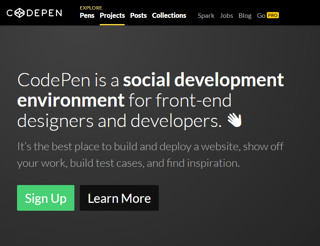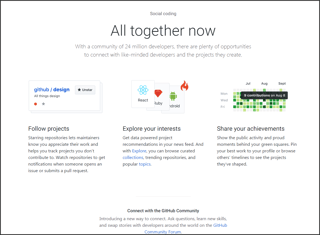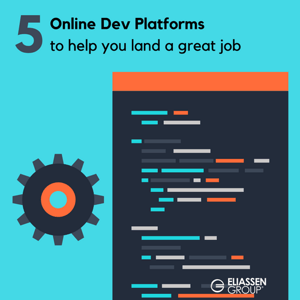So, you say you’re a talented developer with experience in Angular, React, Node, and other hot technologies. And you’ve got a pretty strong resume that talks about your recent projects. While that’s all great, there’s one piece of advice that we offer to every developer seeking a great new position with a top tech company: take advantage of the amazing online development platforms to create a profile where you can SHOW examples of the work you have done.
This helps to accomplish a bunch of things:
- It truly shows off your talent and can dispel any preconceived notions. If you’re right out of school or have only 1-2 years of experience under your belt, hiring managers might view you as being very junior and inexperienced if they just read about your background on a resume. But with a living online profile of your work in front of him/her, you can cut through those potential apprehensions to show what you’re capable of.
- You can set yourself apart in the initial evaluation stages of candidate searches. For example, if a company is looking for a Ruby developer with jQuery experience, it’s very easy to locate specific developers who possess these skills and check out their code projects. This becomes your portfolio and ensures that potential employers see your work first hand.
- These platforms offer a window into potential employers. Just as companies can visit your profile and see your projects, you also potentially have the ability to see what they are up to – how they work, who their developers are and the types of projects they have going on. Not all companies will have accounts and projects out there, but oftentimes their developers will have accounts on GitHub, CodePen, and others.
- You’re showcasing your personal brand. In many cases, these tools offer the functionality to create your own website and/or blog. When you can connect your thought leadership with the projects you’ve done, now you can paint a true picture of what you will bring to a potential employer.
- You’re joining a community and extending your network. The development community is an extremely vibrant group that enjoys sharing information on the latest trends, asking questions and offering potential solutions. By engaging out on these networks, you can keep abreast of what’s new and make connections that will likely serve you well in your career. They may even make you aware of job opportunities within their companies and offer up a reference!
So now that you know the WHY of creating an online portfolio of your development work, here’s the HOW. There are several really great platforms out there that we see regularly. Here is an overview of each one and the functionality that they offer:
CodePen

CodePen is a platform for front end designers and developers to showcase their work. And you’re not just making the work available, but visitors can actually view and run your applications right within the tool. You can also create your own website and blog out on CodePen so that you don’t have to maintain a separate site. And one of the most powerful aspects of CodePen is its community; you can post projects, check out other work, ask questions and connect with like-minded professionals.
GitHub
 GitHub is an online open source community where users can build out their profiles and develop repositories of code that can be shared with other developers for collaboration, and with potential and current employers for review and testing. It also offers integration with third party tools. There are many conversations taking place and expert blog posts that can help developers to stay on top of the latest technologies and projects.
GitHub is an online open source community where users can build out their profiles and develop repositories of code that can be shared with other developers for collaboration, and with potential and current employers for review and testing. It also offers integration with third party tools. There are many conversations taking place and expert blog posts that can help developers to stay on top of the latest technologies and projects.
jsFiddle
jsFiddle enables developers to test and share JavaScript, HTML, and CSS code and is complete with a JavaScript library, placement tools and examples. You can collaborate with other developers real time and the simplicity of the platform means you can jump right in.
Bitbucket
Similar to GitHub, Bitbucket is used for development projects that use either Mercurial or Git revision control systems and integrates with other tools such as Jira, Trello, and HipChat. It is mainly used for code and code review and allows developers to manage and collaborate on projects.
Stack Overflow
Stack Overflow is a huge developer community that helps dev professionals to ask and answer questions about code and technology. You can ping the community as needed and see top Q&A. In this way, you can build up a profile of the questions you’ve answered and posted, adding to your professional credibility and personal brand.
Now that we’ve covered the top online development tools and communities, let’s cover a few DOs and DON’Ts:
- Yes, it’s okay and beneficial to have accounts on several of these platforms. Some developers will use one to show off their work more visually but they might make another profile more development-focused, showing different sides of their work. This is great!
- Here’s what’s not great: having online profiles out there that are outdated and don’t show off your best work. You want to be sure that each profile is representative of your current skillsets.
- Don’t forget that you must be aware of any non-disclosures that are active or proprietary information that is protected/copyrighted. These terms may prohibit you from uploading code to these sites.
- Lastly, remember that personal and school projects are okay to post as long as they effectively showcase what you are capable of; it’s much less about where it came from and much more about sharing your best work.
Above all else, keep it fresh, keep contributing, keep learning, and engage with the development community; it will pay dividends now and throughout your career.
Do you have questions about your online profiles?
We’d be happy to take a look at them and provide feedback.
Connect With Us


